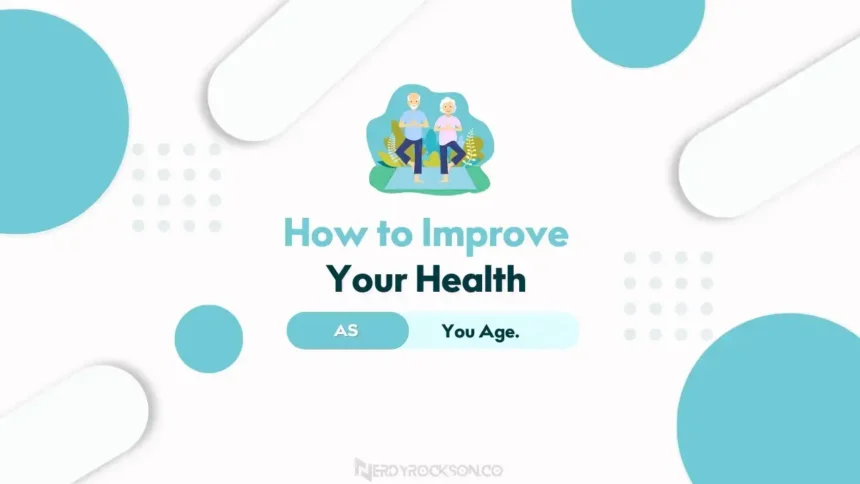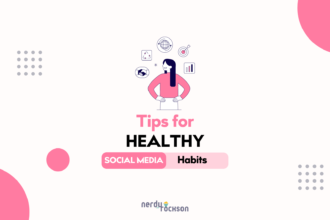As we grow older, maintaining good health becomes increasingly apparent. Ageing is a natural process, but with it comes a higher risk of various health issues and a decline in physical and mental capabilities. By taking proactive measures to improve our health, we can increase our chances of living a longer, more fulfilling life and enjoy a higher quality of life in our later years.
This blog post aims to provide valuable insights and practical tips on improving your health as you age. We will delve into critical areas that significantly impact your overall well-being, including maintaining a balanced diet, engaging in regular physical activity, prioritising mental health, staying socially connected, and keeping up with regular health check-ups. Incorporating these strategies into your daily routine can pave the way for a healthier, happier, and more vibrant life in your golden years.
#1 | Maintain a balanced diet
As we age, our bodies undergo various changes affecting how we process and absorb nutrients. Consequently, it becomes even more crucial to maintain a balanced diet to support our overall health and well-being. Proper nutrition helps older adults maintain a healthy weight, prevent or manage chronic conditions such as heart disease and diabetes, and promote mental sharpness and emotional well-being.
Nutrients to focus on
- Protein: Protein is essential for maintaining muscle mass, supporting a healthy immune system, and aiding in tissue repair. As we age, our protein needs increase to help counteract age-related muscle loss. Include a variety of protein sources such as lean meats, fish, poultry, beans, lentils, and dairy products in your diet.
- Fibre: A fibre-rich diet promotes healthy digestion, lowers cholesterol levels, and helps control blood sugar levels. Older adults should consume at least 30 grams of fibre per day, which can be achieved by incorporating whole grains, fruits, vegetables, and legumes into your meals.
- Healthy fats: Omega-3 fatty acids and monounsaturated fats are crucial for heart health, brain function, and reducing inflammation. Focus on including healthy fats such as those found in oily fish (e.g., salmon, mackerel), nuts, seeds, olive oil, and avocados.
- Vitamins and minerals: Older adults require specific vitamins and minerals in adequate amounts to maintain optimal health. Key nutrients to focus on include vitamin D, calcium, vitamin B12, and potassium. Consult with your healthcare provider to determine if supplementation is necessary in addition to a balanced diet.
Tips for creating a balanced meal plan
- Plan your meals ahead of time: By planning your meals in advance, you can ensure that you include a variety of nutrient-rich foods and avoid last-minute unhealthy choices.
- Fill half of your plate with fruits and vegetables: Aim to consume a colourful array of fruits and vegetables, as different colours provide different nutrients and antioxidants.
- Choose whole grains: Opt for whole grain varieties of bread, pasta, and rice, which are higher in fibre and nutrients compared to their refined counterparts.
- Stay hydrated: Drink plenty of water throughout the day to support digestion, circulation, and overall health.
- Practice portion control: Eating smaller, more frequent meals can help prevent overeating and support stable blood sugar levels.
By focusing on a balanced diet rich in essential nutrients, older adults can significantly improve their overall health and well-being, paving the way for a happier and more active life.
#2 | Regular physical activity
Exercise plays a vital role in maintaining and improving overall health as we age. Regular physical activity offers numerous benefits for older adults, including increased muscle strength, improved balance and coordination, better cardiovascular health, enhanced cognitive function, and reduced risk of chronic diseases. Moreover, exercise can improve mental well-being by alleviating stress, anxiety, and depression while promoting better sleep.
Types of exercise to consider
- Cardiovascular exercises: Aerobic activities, also known as cardiovascular exercises, improve heart and lung function and increase endurance. Examples include brisk walking, swimming, cycling, and dancing. Aim for at least 150 minutes of moderate-intensity aerobic activity or 75 minutes of vigorous-intensity aerobic exercise per week, spread across several days.
- Strength training: Resistance or strength training exercises help maintain muscle mass, improve bone density, and prevent age-related muscle loss. Incorporate strength training exercises, such as lifting weights or using resistance bands, into your routine at least twice a week, targeting all major muscle groups.
- Flexibility and balance exercises: As we age, our flexibility and balance can decline, increasing the risk of falls and injuries. Incorporate stretching exercises, yoga, tai chi, or Pilates into your routine to improve flexibility, balance, and overall mobility.
Tips for staying motivated and safe during workouts
- Consult a healthcare professional: Before starting any exercise program, consult your healthcare provider, particularly if you have any pre-existing conditions or concerns.
- Start slow and progress gradually: Begin with a lower intensity and gradually increase the duration and intensity of your workouts to avoid injury and ensure long-term success.
- Find activities you enjoy: Choose exercises that you find enjoyable and look forward to doing. You are more likely to stick with a routine if it brings you joy.
- Listen to your body: Pay attention to how your body feels during and after exercise. Adjust your workout intensity and duration accordingly to prevent injury and overexertion.
- Set realistic goals: Establish attainable fitness goals and celebrate your achievements to maintain motivation and a sense of accomplishment.
- Warm-up and cool-down: Incorporate a proper warm-up and cool-down routine to prepare your body for exercise and aid recovery.
- Consider exercising with a friend or group: Having a workout buddy or joining a group class can provide additional motivation, support, and accountability.
By engaging in regular physical activity tailored to your abilities and interests, you can significantly improve your health and well-being as you age, making it easier to enjoy life to the fullest.
#3 | Prioritise mental health
Mental health is crucial to overall well-being, particularly as we age. Poor mental health can negatively impact physical health, leading to a weakened immune system, increased risk of chronic diseases, and a decline in overall quality of life. Prioritising mental well-being is essential for maintaining a healthy, balanced lifestyle and enjoying a fulfilling, happy life in our later years.
Strategies for managing stress
- Mindfulness and meditation: Practicing mindfulness and meditation can help reduce stress, improve focus, and promote emotional well-being. Set aside time each day to engage in mindfulness exercises or guided meditation, focusing on your breath and being present at the moment.
- Social support: A strong social network can help buffer the effects of stress and provide emotional support during challenging times. Nurture your relationships with family and friends, and don’t hesitate to reach out for help when needed.
- Hobbies and leisure activities: Engaging in hobbies and leisure activities you enjoy can provide a sense of accomplishment and purpose while also offering a healthy outlet for stress relief. Explore new interests or revisit old passions, such as gardening, painting, or playing a musical instrument.
The role of sleep in mental health
Sleep plays a critical role in maintaining mental health, as it allows our minds to rest, recover, and process emotions. Poor sleep can exacerbate stress, anxiety, and depression while affecting cognitive function and memory. To support healthy sleep:
- Establish a consistent sleep schedule: Aim for 7-9 hours of sleep per night and try to go to bed and wake up at the same time each day.
- Create a sleep-friendly environment: Make your bedroom conducive to sleep by keeping it cool, dark, and quiet and investing in a comfortable mattress and pillows.
- Develop a bedtime routine: Establish a calming pre-sleep routine, such as reading a book, taking a warm bath, or practising relaxation techniques.
- Limit screen time before bed: Reduce exposure to screens and blue light in the evening, as they can interfere with the production of melatonin, a hormone that regulates sleep.
By prioritising mental health and adopting strategies to manage stress and anxiety, you can support your overall well-being as you age and enhance your ability to enjoy life to its fullest.
#4 | Stay socially connected
Social connections significantly promote mental and emotional well-being for individuals of all ages, but they are particularly important as we age. Staying socially connected can help reduce feelings of loneliness and isolation, boost self-esteem, and even contribute to better physical health. Older adults who maintain strong social connections tend to experience better cognitive function, a lower risk of depression, and a higher quality of life.
Ways to maintain and foster social connections
- Join clubs or groups: Participate in clubs or social groups that align with your interests, such as book clubs, gardening clubs, or exercise classes. This provides an excellent opportunity to meet like-minded individuals and form new friendships.
- Attend community events: Stay involved in your local community by attending events, workshops, and classes. These gatherings can offer valuable opportunities to connect with others and stay informed about what’s happening in your area.
- Volunteering opportunities: Volunteering not only benefits your community but can also help you build new relationships and develop a sense of purpose. Look for local organisations and charities that align with your values and interests, and offer your time and skills to support their mission.
Embracing technology for social interaction
As technology continues to evolve, it offers new and innovative ways to stay connected with friends and family. Embracing technology can help bridge the physical distance between loved ones and provide opportunities to meet new people.
- Video calls: Utilise video calling apps such as Zoom, Skype, or FaceTime to chat with friends and family face-to-face, even if you’re miles apart.
- Social media: Platforms like Facebook, Instagram, and Twitter offer opportunities to stay in touch with loved ones, share updates, and join interest-based groups to connect with others.
- Online classes and events: Attend virtual workshops, webinars, or fitness classes to engage in activities you enjoy while interacting with others remotely.
By actively seeking and nurturing social connections, you can greatly enhance your quality of life as you age, contributing to improved physical and mental health, as well as a heightened sense of belonging and purpose.
#5 | Regular health check-ups
Preventive healthcare plays a crucial role in maintaining good health as we age. Regular health check-ups and screenings can help detect potential issues early, enabling timely intervention and treatment, which can significantly improve outcomes. Additionally, staying up-to-date with vaccinations and adhering to a healthcare professional’s advice can help reduce the risk of developing chronic conditions and other age-related health concerns.
Recommended screenings and tests for older adults
The specific screenings and tests you require will depend on your age, gender, medical history, and risk factors. However, some standard recommended screenings for older adults include:
- Blood pressure: Have your blood pressure checked at least once a year, as high blood pressure can increase the risk of heart disease and stroke.
- Cholesterol levels: Regular cholesterol screenings can help identify elevated levels, which may increase the risk of heart disease.
- Diabetes screening: A fasting blood glucose test or HbA1c test can help detect prediabetes or diabetes, allowing for early intervention and management.
- Cancer screenings: Age-appropriate cancer screenings, such as mammograms for breast cancer, colonoscopies for colorectal cancer, and prostate-specific antigen (PSA) tests for prostate cancer, can help detect cancer at an early, more treatable stage.
- Bone density screening: A bone density test can identify osteoporosis, a condition that weakens bones and increases the risk of fractures.
- Eye and hearing exams: Regular eye and hearing exams can detect age-related vision and hearing changes, enabling prompt treatment or adjustments.
- Immunisations: Stay up-to-date with recommended vaccinations, including the annual flu vaccine, pneumonia vaccine, and shingles vaccine.
Communicating with healthcare professionals
Open communication with your healthcare providers is essential for ensuring you receive the best care possible. Keep the following tips in mind:
- Prepare for appointments: Before your appointment, list any symptoms, concerns, or questions you may have to ensure you address all important points during the visit.
- Be honest: Provide accurate and complete information about your medical history, current medications, and lifestyle habits, even if some details may be uncomfortable to discuss.
- Ask questions: If you don’t understand a diagnosis, treatment plan, or recommendation, don’t hesitate to ask for clarification or additional information.
- Seek a second opinion: If you’re uncertain about a diagnosis or treatment plan, consider seeking a second opinion from another healthcare professional to ensure you make informed decisions about your health.
By prioritising regular health check-ups and maintaining open communication with your healthcare providers, you can take a proactive approach to your well-being, allowing you to age confidently and gracefully.
Conclusion
Ageing is a natural part of life, but by taking proactive steps to maintain and improve our health, we can ensure that our golden years are as enjoyable, fulfilling, and vibrant as possible. In this blog post, we’ve covered several key areas to focus on as you age:
- Maintaining a balanced diet rich in essential nutrients to support overall health.
- Engaging in regular physical activity, including cardiovascular, strength, and flexibility exercises.
- Prioritising mental health by managing stress and anxiety and fostering good sleep habits.
- Staying socially connected to maintain strong emotional well-being and a sense of belonging.
- Keeping up with regular health check-ups, screenings, and vaccinations for preventive care.
As we’ve discussed, there are numerous actions you can take to improve your health and well-being as you age. By implementing these strategies into your daily life, you’ll be better equipped to face the challenges that come with ageing and enjoy a higher quality of life in your later years. Remember, it’s never too late to start taking charge of your health. So, embrace these tips and embark on your journey towards a healthier, happier, and more fulfilling life as you age.











